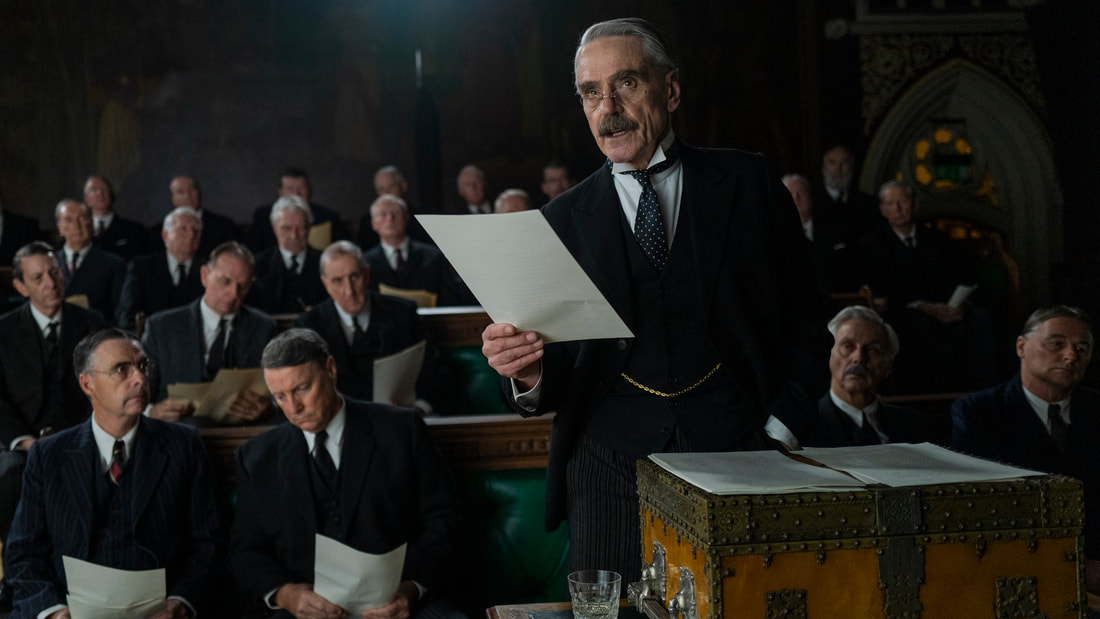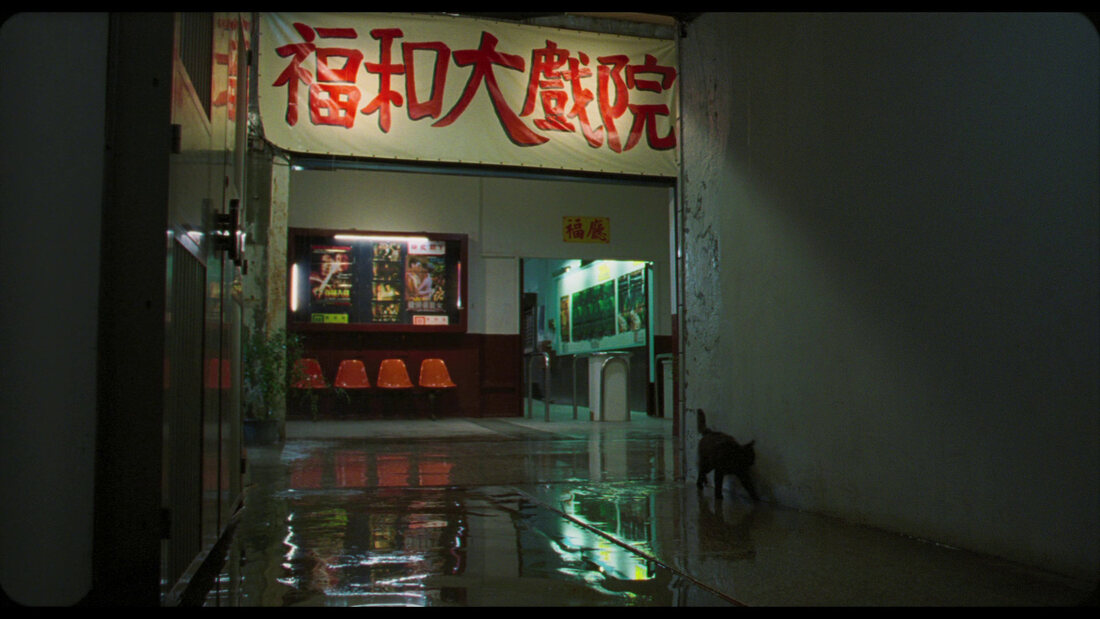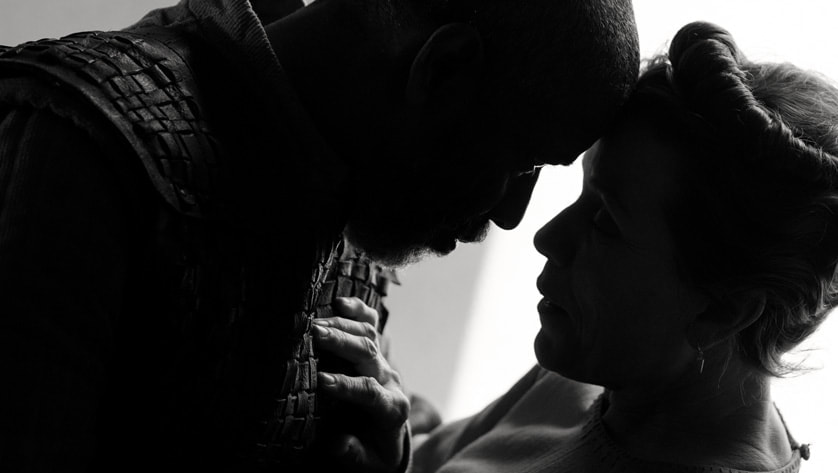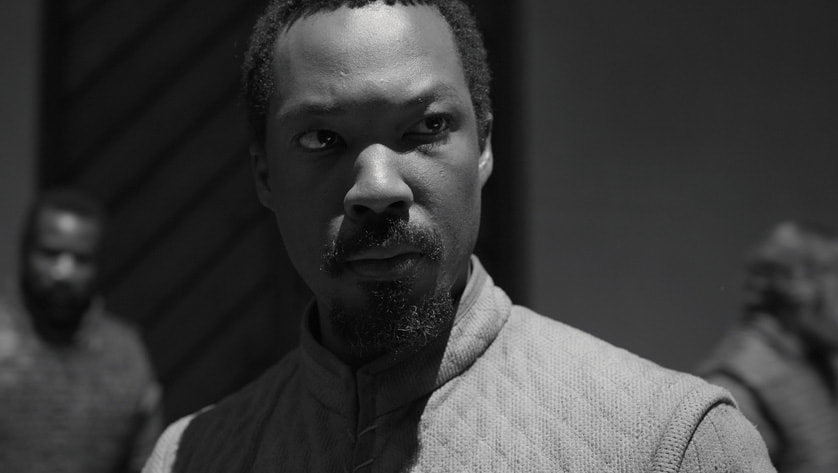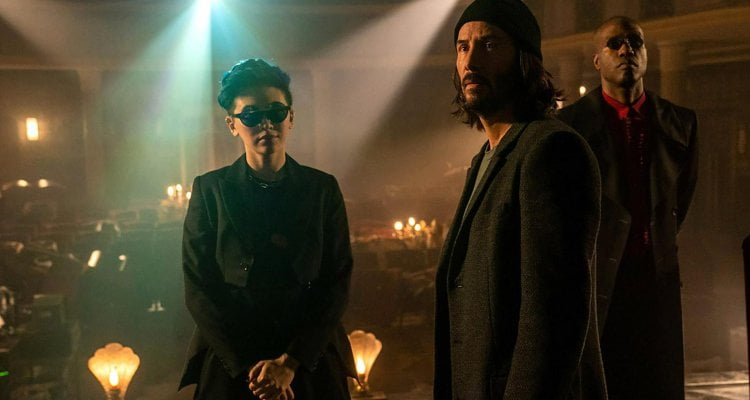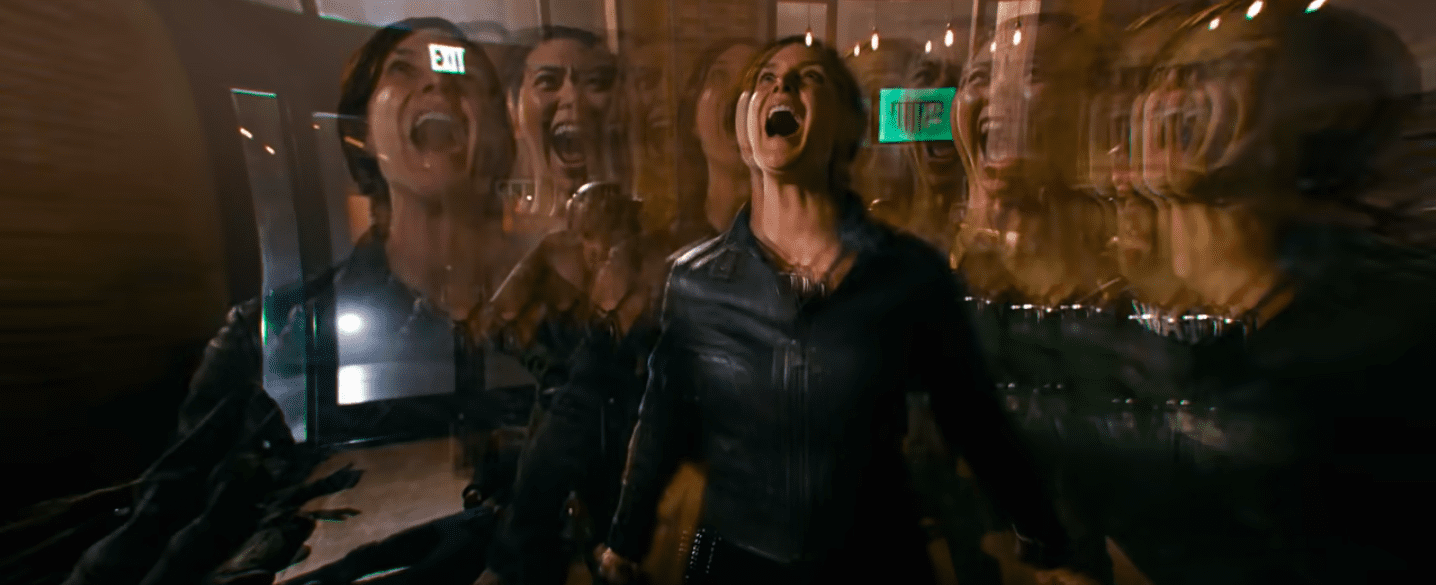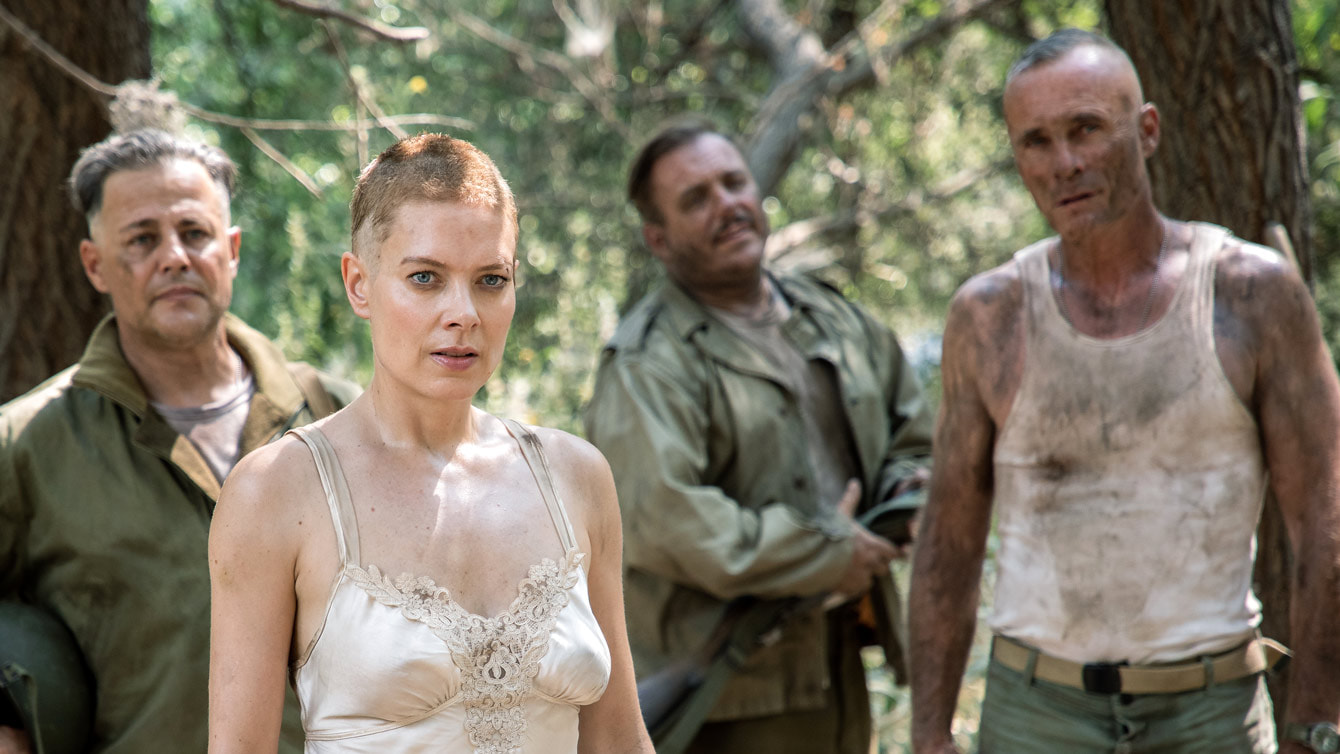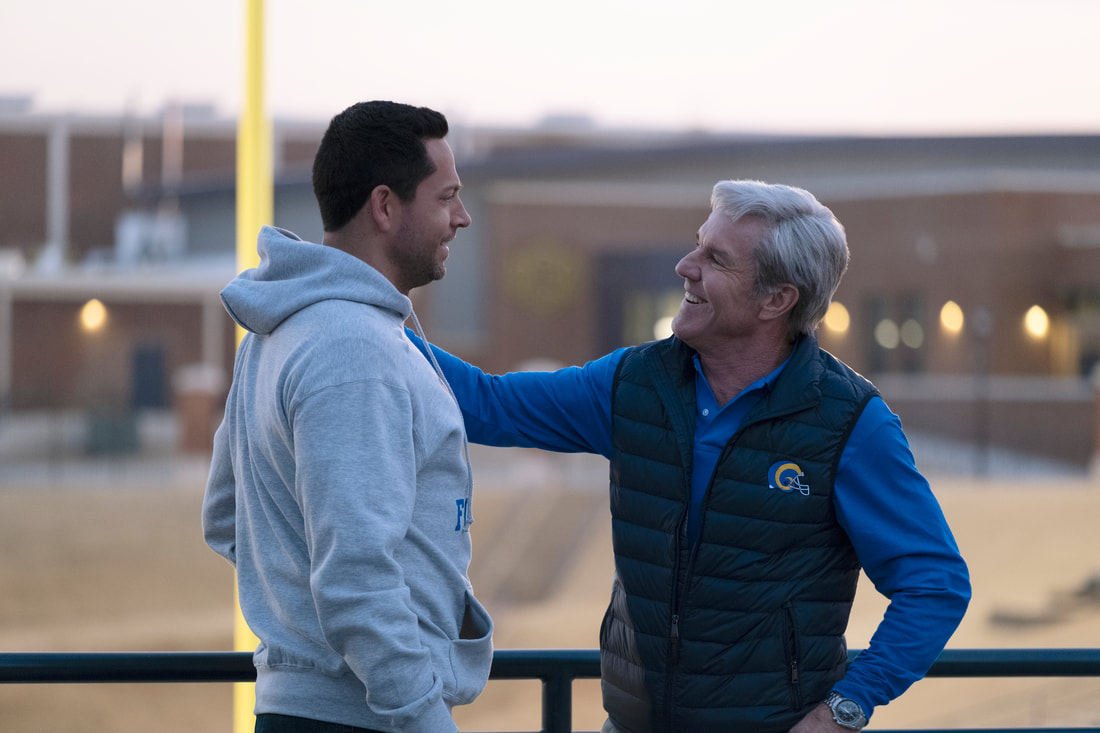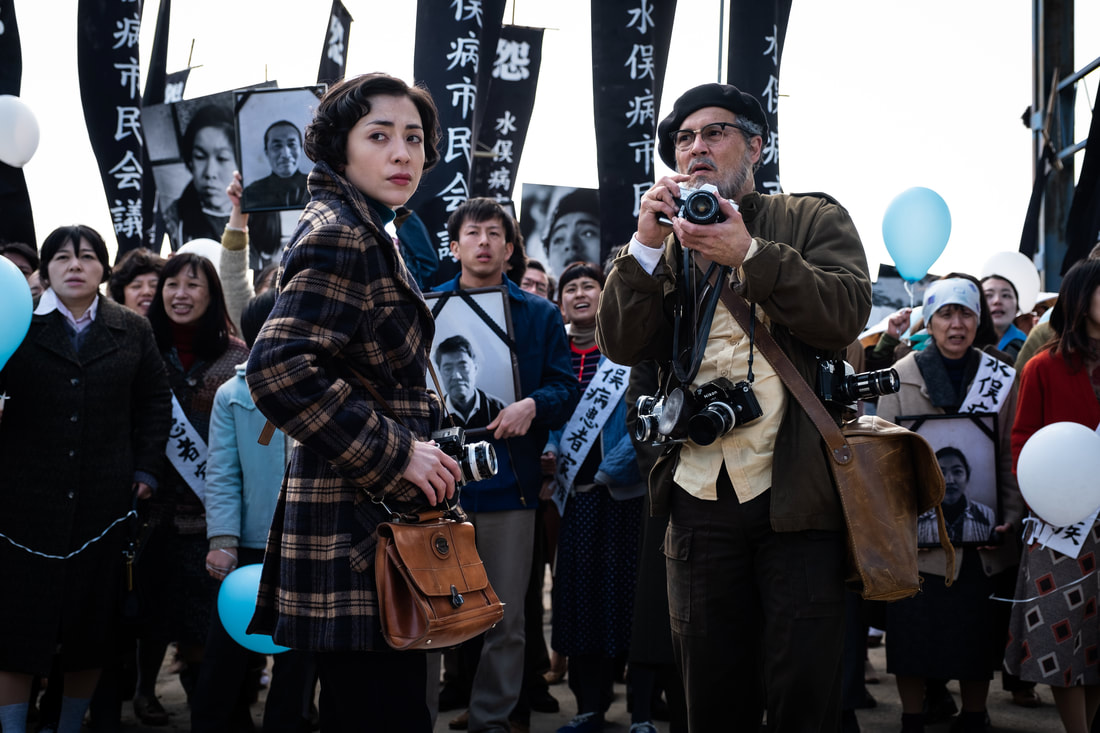|
Review by Sean Boelman
Every year, there are a handful of would-be prestige pictures released just under the wire before the turn of the calendar signals the beginning of a new awards cycle. More often than not, these campaigns seem to be more out of obligation than the film genuinely earning it, and that is the case with Munich — The Edge of War, a passable thriller elevated by a solid cast.
Based on Robert Harris’s novel, the movie follows a British diplomat who, during the rise of Adolf Hitler, finds himself at the center of potential peace negotiations when a former classmate of his who is working for the German government begins to question his allegiance. In terms of espionage thrillers, it’s very by-the-numbers, with a lot of boardroom talk and very little action. Perhaps the most fundamental flaw of the film is the fact that these events didn’t really have all that much effect on the eventual onset of World War II, and yet the movie expects the audience to believe that they did. It’s really just a bunch of proceedings that amounted to little more than an insignificant formality, not the precursor to war that they would have the viewer think. There have been so many films now about “good Nazis” who turn against the tyraniccal ways of the Third Reich, and at this point the message has become old. It would take a very fresh perspective on the dilemma of deciding between patriotism and morality for it to be interesting, and Ben Power’s script does not offer that.
What Power does bring to the table is an interesting angle on British Prime Minister Neville Chamberlain, who is one of the more controversial political figures in history. The lead characters are stale and underdeveloped, but it is this depiction of Chamberlain as a conflicted man, torn between the expectations of a country and what he knows but is unable to say, that allows the movie to stand out.
Jeremy Irons gives a performance that is one of, if not the single best he has given in his career. Every time he is on screen is absolutely electric, commanding the viewer to watch him rather than anything else happening on screen. George MacKay is the other notable star in the film, although his role isn’t as substantial or memorable. From a technical level, the movie is competent even if it does leave something to be desired. The production design does a good job of setting the time period, but what is missing is a strong mood. For a film that is set largely behind closed doors, the movie fails to create a sense of claustrophobia. Only one scene, the first in which the audience sees Hitler, is adequately suspenseful. Munich — The Edge of War has an elevated sense of self-importance, and that is what drags it down. Ultimately, it’s just a very average espionage thriller with a strong supporting performance and an intriguing take on a well-known politician. Munich — The Edge of War hits theaters on December 31 and Netflix on January 21. Rating: 3/5
0 Comments
Review by Camden Ferrell
Tsai Ming-linag is a renowned director based in Taiwan and is considered one of the region’s most accomplished filmmakers. He has directed numerous features and short films in a career spanning across four different decades. One of his most well-received films, Goodbye, Dragon Inn, released in 2003, is receiving a 4K restoration and release as this calendar year closes. While the film is a sincere ode to the movie theater experience, its execution is slow and deliberate in a way that may put off potential viewers.
The Fu-Ho Grand is a movie palace in Taipei that is about to permanently shut their doors. In its final screening, the theater shows the 1967 wuxia film Dragon Inn. As the movie plays, we see the lives of an array of patrons and employees intersect. It’s a very simple premise that could serve as the foundation for thematic exploration and promising character interaction. While it’s clear that the movie comes from a place of love, its execution leaves a lot to be desired. Its dialogue is absolutely minimal and while this makes sense for many characters given the setting, it doesn’t give the viewer much to latch onto. Even though all of the action on screen has a purpose, there’s nothing to supplement it, and the movie feels bloated as a result. The minimal action can only say so much, and when a large chunk of the film’s runtime is spent in these long takes, its message loses its impact. I think some more in-depth dialogue in the scenes outside the theater could have fleshed out these interesting characters in a more entertaining way.
The actors are fine throughout although there isn’t much for them to do outside of acting like themselves. Any characters with interesting arcs or backstories don’t do anything impressive and further contribute to the occasional hollowness that plagues the entire film. While the movie is short, I would have preferred a longer film that gave more depth and personality to its ensemble. Certain characters had really interesting roles that could have been expanded on and made the film feel more complete and rewarding.
The cast of characters include a ticket taker, a projectionist, an eccentric tourist, and also actors from the film being screened. Without revealing any details about these characters, each of them could have had engaging arcs that could have further cemented the film’s themes in a memorable and captivating way. However, the film is content with merely observing and trying to find beauty in its mundanity, gracing the audience with only a glimpse of genius every once in a while. As mentioned before, Goodbye, Dragon Inn is an ode to the movie-going experience. It explains this sentiment perfectly, and the film is made with genuine passion, but it does it in a way that ultimately feels pretentious. This is unfortunate for a movie with a legitimately uplifting yet bittersweet sentiment that billions of people can relate to. It’s poetic, but it’s a poem that you’ll either love or feel indifferent towards. Goodbye, Dragon Inn is available in select theaters and streaming through Metrograph December 31. Rating: 2.5/5
Review by Sean Boelman
With a career that has spanned more than thirty years, Pedro Almodóvar is one of the most acclaimed Spanish-language filmmakers of all time. His newest film, Parallel Mothers, is yet another starring his frequent collaborator Penélope Cruz, and unsurprisingly, he again guides her to one of the best performances of her career.
The film follows two mothers who give birth on the same day as their lives become unexpectedly intertwined. Most of Almodóvar’s film’s are melodramatic, almost feeling like a better-made telenovela. It’s very twisty, and while the plot points are on the predictable side, the filmmaker’s skill makes the film resonant nevertheless. One of the drawbacks of the film is its pacing. All of Almodóvar’s work requires a great deal of patience, but this one takes even more time than usual to reveal its hand. Part of what makes it frustrating is that the audience knows exactly where the film is heading, and yet it tries to play it off as a surprise. Furthermore, the film doesn’t really connect all of its pieces until the final act. The first two thirds are compelling, but leave the viewer wondering exactly why they are watching it. And then the last thirty minutes is exceptional, tying everything together in a way that is enormously profound. The final image of the film is without a doubt one of the finest of the year.
The film does a very good job of building the characters in a way that is fascinating and complex. One of Almodóvar’s strengths is that he takes these stories that seem so ridiculous and makes them feel extremely human. Even though the characters don’t always make the most likable decisions, the audience still sympathizes with them.
The absolute highlight of the film is Penélope Cruz’s performance. Each of the three acts calls for something very different from her, and she pulls off all of them while making it feel like a cohesive performance. And her chemistry with junior actress Milena Smit, who also holds her own, is excellent. On a technical level, the film has Almodóvar’s usual style of hyperrealism to the point of looking artificial. It’s this constant fluctuation between the real and the fake which drives both the story and its execution. And the cinematography by José Luis Alcaine is exceptional, especially during the more symbolic second half. Parallel Mothers might be one of Almodóvar’s weaker works to date, but even his lesser attempts are still thoroughly impressive. It’s worth watching for Penélope Cruz’s turn if nothing else, as it is extraordinary in every sense. Parallel Mothers is now playing in theaters. Rating: 4/5
Review by Sean Boelman
Initially, nature documentaries may seem simple given that so many of their shots are done from afar, but the reality is that they are some of the most complex films around. Marie Amiguet and Vincent Munier’s The Velvet Queen is a perfect example of why, a gorgeous and often awe-inspiring movie.
The film follows a wildlife photographer and a novelist who set out on a quest in the Tibetan plateau attempting to spot the elusive snow leopard. Although watching people watch wildlife may not sound like it is the most cinematic story on paper, Amiguet does an excellent job of finding the narrative thread to carry it through. One of the things that really drives this story is the relationship between the two human subjects. The movie pairs two people who are highly experienced in this world, a wildlife photographer and an adventurer, and their love for nature is infectious. And yet, despite both of them being very skilled in what they do, the film doesn’t feel inaccessible at all. Of course, the main draw of the movie is not the people — it’s the animals. The film mythicizes the snow leopard in a way that makes us fall in love with the species’s breathtaking elegance. There is a certain level of mystery to the big cat because of the fact that its habitat is so secluded and that it is such a reclusive species, and the movie really leans into that.
However, with that also comes a lot of waiting. The subjects of the film are very patient in their search for the snow leopard, but the movie does not demand the same patience of the viewer. Instead, we get to see and learn about some of the other animals that share the ecosystem with the eponymous creature.
There is a lot to be said in the film about the fleeting nature of natural beauty, which lends the movie some implicit environmentalist themes. One of the film’s main messages is about human interference in the ecosystem. These questions directly relate to the subjects trying to catch a glimpse of the snow leopard, but can also be applied to the bigger picture. Of course, the movie is also absolutely gorgeous in the way it was shot. The nature cinematography is phenomenal, shot predominantly from afar because of the difficulties of approaching the snow leopard up close. However, the techniques used by the filmmakers make it feel intimate nonetheless. The Velvet Queen is a great nature documentary that is impressive in its quietude. All of the elements come together here to create a movie that is absolutely breathtaking, both visually and in what it does narratively. The Velvet Queen is now in theaters. Rating: 4/5
Review by Sean Boelman
The cinema is no stranger to Shakespeare adaptations, as many filmmakers over the years have attempted to bring the work of the Bard to the screen with varying degrees of success. It’s a difficult line to toy — being faithful to the source material while still interpreting it for a modern audience — and Joel Coen does it perfectly with his version of “The Scottish Play”.
The movie tells Shakespeare’s classic story of a Scottish lord who receives a vision of three witches who tell him he is destined to become King, causing him to become a tyrant mad with power. It’s a story that has been done many times before, both directly and through reimaginings like Kurosawa’s Throne of Blood, and Coen’s take on the work is direct in terms of scripting but artistically distinctive. One of the most distinctive things about this play in particular is Shakespeare’s breakneck pacing, and Coen preserves that. There aren’t many subplots to be found, and so the audience is mesmerized as Coen weaves Shakespeare’s intricate web of double-crosses and deceit. The only scene which strays from this line is the perplexing Porter scene, brought to life here hexingly by Stephen Root. In what was a brilliant decision, Coen does not modernize the Shakespearean language whatsoever, nor does he try to make the themes feel new. But it is not the way in which it is written that the film is distinctive, but the way in which it is directed. Everything about the movie is done as if it was a psychological horror, which will get audiences invested in the story.
Perhaps the most interesting thing about the film is the way in which it is shot by Coen. Much of the movie was shot on soundstages, which gives it a surreal, artificial look. The result is a nightmarish feel that is more haunting than any other adaptation of this work has been. And the sound design is certainly among the best of the year.
With how closely Coen sticks to the text, the characters work as well as they ever do. The Thane of Glamis is a wonderfully complex character, morphing from valiant hero to detestable tyrant. And while Denzel Washignton may have been an unorthodox choice for the character given that he is older than usual for those who portray the Thane, he brings an extraordinary vigor to the character. The ensemble of the film is also exceptional. Frances McDormand gives an unhinged, sweeping performance as the Lady, but it’s rousing in every sense of the word. Corey Hawkins surprisingly steals the show as Macduff, absolutely radiating cool. And other notable turns come from Alex Hassell, Brendan Gleeson, and Harry Melling. With his adaptation of such an iconic work, Joel Coen has managed to stick to what everyone knows while still making it feel unique with his style. It’s a truly mesmerizing watch, and one of the finest Shakespeare films of all time. Joel Coen’s version of “The Scottish Play” hits theaters on December 25 and Apple TV+ on January 14. Rating: 5/5
Review by Camden Ferrell
The Matrix is a staple of sci-fi cinema, boasting an insightful story and mesmerizing effects that still hold up by today’s standards. Its two sequels weren’t received as positively at the time of their release, but after eighteen years, we are once again about to revisit this beloved world. Unlike the previous films, this new film, The Matrix Resurrections is directed only by Lana Wachowski. This sequel takes the franchise in a new direction with a fresh, original, and surprisingly meta story that will thrill fans of the original and newcomers to the franchise.
After the events of the previous films, this fourth film sees our protagonist, Neo, living a seemingly normal life. He works a regular job, but he also regularly visits a therapist who medicates him with blue pills to counteract his abnormal visions. Without saying too much about the plot, this movie is another journey back into the bonkers world of the titular Matrix. Needless to say, this premise is exciting for fans of the series, and there are a lot of great mysteries to explore throughout. The script is penned by Wachowski, David Mitchell, and Aleksandar Hemon, who both have collaborated with Wachowski in the past. Their writing is fresh, and their combined perspective will change the franchise for the better. They tackle its themes and mysteries with splendor, and their approach is surprisingly hilarious especially in its first act. It’s definitely an ambitious narrative that may be genius or heavily flawed depending on who you ask. However, I thought it was almost on par with the original film in terms of its creativity. Keanu Reeves and Carrie-Anne Moss both return to the franchise, playing very well off of each other. The movie also stars Yahya Abdul-Mateen II, Jonathan Groff, Jessica Henwick, and Neil Patrick Harris to name a few. All of these new additions are great. Their personalities fit right in among all of the insanity going on, and there are definitely some surprises to enjoy for fans of the series.
One of the franchise’s defining characteristics is its revolutionary action and visual effects. While this film may not be groundbreaking by today’s standards, it still has a lot to boast in both fields. Its action is engaging throughout, and its final act set pieces are absolutely exhilarating. It also revives some of our favorite effects from the franchise in a way that still feels fresh and captivating.
The film can feel a little slow in its middle section, and this is easily its most telling flaw. It has a fantastic first and final act that feel disjointed due to some abrupt tonal and narrative shifts. While the film is never boring, its pacing could make or break the film for viewers, especially considering its hefty runtime. This newest installment seems like the type of film that has the potential to be heavily divisive among the fanbase. It’s bold, it’s original, and it’s ambitious, but there are a lot of things that I really enjoyed about this movie that might not please all audiences. Regardless of its reception, it’s impossible to think The Matrix Resurrections is a lazy cash-grab. This is Lana Wachowski at her most unfiltered. It’s raw, it’s energetic, and it’s a one-of-a-kind experience that stands out as the franchise’s strongest sequel. The Matrix Resurrections is in theaters December 22. Rating: 4/5
Review by Sean Boelman
Filmmaker Jesse V. Johnson has made one thing in his career: straight-to-VOD action B-movies — but as they say, “If it ain’t broke, don’t fix it.” So he keeps putting out consistently entertaining filler like Hell Hath No Fury, an action-packed but largely unoriginal Nazi gold adventure.
The film follows a French national who, after being branded a traitor, is rescued by American forces under the condition that she leads them to a hidden cache of Nazi gold. As is the case with a lot of Johsnon’s movies, there isn’t a whole lot of complexity to it, but it’s overly convoluted for something that essentially only needs to be the bones for a few action set pieces. Perhaps the best thing about the film is that it is mercifully short, with a runtime of ninety-four minutes including credits. And given the fact that there is so much action in the movie, there’s not a lot of dead space to be found. Although the action isn’t that unique within the genre, the film is just so loud that it’s hard not to be entertained by it. There is a certain energy that Johnson brings to the movie, and that is what really makes it tick. Even though it’s just some pretty generic gunfights in a cemetery, it’s the way that Johnson directs it that makes it interesting. The use of spatial geography in the film is definitely interesting, creating some much-needed tension.
Without a doubt, the biggest drawback of the movie is that there is very little to be said in the film. Themes of patriotism during WWII have been done to death, and so Johnson thankfully spares the audience of rehashing those ideas. But there is still the groundwork here for something interesting with regards to the character dynamics.
However, the character development in the movie is extremely shallow, and that also holds the film back. There is no way to get emotionally invested in the story because every one of the characters is a pure archetype. And beyond that, virtually none of the characters has an arc beyond the protagonist, whose growth is entirely predictable. The ensemble of the movie is fine enough, but there’s no chance for any of them to shine. The only performer with a substantially meaty part is Nina Bergman, whose performance is fine, but doesn’t have much in the way of nuance. Some of the antagonistic players are exaggeratedly enjoyable, but not in a memorable way. Hell Hath No Fury isn’t a very deep film in any way, but the action is enough fun to make it worth a watch. Jesse V. Johnson has always made B-movies that are slightly ahead of the rest of the pack, and this is an example of that. Hell Hath No Fury is now available on VOD. Rating: 3/5
Review by Dan Skip Allen
It's no secret that I am a huge sports fan. I follow all the Boston teams, including the New England Patriots — the team that won their first Super Bowl at the expense of the (then) St. Louis Rams in Super Bowl XXXVI. Kurt Warner was the quarterback of the Rams at that time. As a Patriots fan, even I can get behind the story of an American Underdog like Kurt Warner. I even had a tear in my eye at a couple of emotional scenes.
The film picks up as Warner (Zachary Levi) is playing for North East Iowa. He goes through a lot to be the starting quarterback. This doesn't help him get drafted into the NFL, but he does get signed as an undrafted free agent by the Green Bay Packers. His stint there doesn't last as he's fired after two days in camp. He has to go back home to Iowa with his tail between his legs. He takes a job as a stocker at a grocery store to make ends meet before his career as a football player finally takes off. Warner couldn't do everything in his life without the support of his family and friends. That includes his wife Brenda (Anna Paquin, The Piano). When Warner first meets Brenda, she tells him she has two children. Only when he meets her at her home does he realize she has a blind autistic son and still lives with her parents. This relationship will last through thick and thin, though. That's what true love is: a relationship that stays together through the good times and the bad. This was part of the strength of Warner's life and at the core of this story. Jon and Andrew Erwin aren't the most famous or popular directing duo, but they have amassed a very nice filmography under their belts. Films such as Woodlawn, I Still Believe, and I Can Only Imagine have made up their career. I've seen them all. They all have a Christian feel to them. That's what makes them stand apart from other directing duo's. Their latest film American Underdog is in the same vein as their other films. They take real people and tell their stories with a Christian twist to them. It works very well.
Sports movies and especially football movies can be notoriously hard to make look realistic. This film isn't the best-looking sports film by any stretch of the imagination. It's not the best football movie either. What it does have is heart and love involved in it that sets it apart from others of the same nature. There were some very emotional scenes in this film. Scenes that even made a tough guy like me tear up a couple of times. There is a quote Warner's mother says that stuck with me after I saw the film: "Winning means everything unless you don't have anyone to share it with." So he picked Brenda and her kids and he will do anything for them.
The cast in the film is very good with a few famous faces besides Levi and Paquin. Dennis Quaid has been in more than a few sports films in his career and he adds American Underdog to the list. He plays Dick Vermeil, ex-head coach of the Rams and Eagles. This isn't the first football coach he's played in his career either. And he's worked with the Erwin Brothers before as well, on I Can Only Imagine. Adam Baldwin, Chance Kelly, and Bruce McGill round out this stellar cast as other football coaches in Warner's past. Warner was involved in every step of turning his life into a major motion picture, and it shows. There are a lot of details only he could know about that make this true-life story work so well. Various scenes in bars learning line dancing or running out of gas and having to walk many miles in the cold and snow help make this film and story come to life. From the cars to hairstyles and clothes, this film is very authentic to the period. Even the Rams uniforms are done very well. This biopic is a time capsule into Warner's inspirational life. It works on all levels. As far as inspirational true-life Christian stories go, this is one of the better ones in recent memory. The Erwin Brothers have this genre all to their own and they embrace making this kind of spiritual faith-based film. It shows in the end product. The acting by all is very good, but Levi and Paquin make this film work with their chemistry on screen. The football scenes are okay, but not great. It's not easy recreating football scenes from the past. In a holiday season of sequels, prequels, and reboots, American Underdog might be the go-to for a change. And it's a very good film to boot. That's coming from a huge Patriots fan. American Underdog hits theaters on December 22. Rating: 4/5
Review by Camden Ferrell
President is a documentary film that sees director Camilla Nielsson returning to the topic of the politics of Zimbabwe. This film had its premiere at the 2021 Sundance Film Festival, playing at numerous festivals since then. For those who are not familiar with the political climate, this documentary is an eye-opening look into blatant corruption that plagues democracy in modern-day Zimbabwe.
After a successful coup in 2017, Robert Mugabe was removed from power in Zimbabwe. The country has since been under the same ruling party. Claims that this new government would protect the integrity of democracy lose footing as the incumbent is challenged by Nelson Chamisa in an election. Chamisa, who draws a lot of comparisons to Nelson Mandela, wants a country that is governed not ruled. However, corruption is on full display as we ponder whether Zimbabwe can ever truly have a free and fair election. This is a globally significant event that the audience has the privilege of experiencing in an engaging and captivating manner. First and foremost, Nielsson understands the fundamentals of storytelling. The narrative structure of this documentary is one of the most impressive aspects of the film. While this couldn’t have been entirely planned, it’s interesting to watch how this director constructs this story while being able to emphasize their themes and messages.
Superficially, the movie is specific to the political climate of Zimbabwe, but Nielsson understands the significance of this event. She uses this story to emphasize the importance and specifically necessity of free and fair elections and a solid democracy. Her themes are strong and developed well, and it’s conveyed in an entertaining manner that audiences will have no problem following with intrigue.
While the film has a lot of great things working for it, there are a few lulls throughout. The movie does take a little while to build up momentum and hit its stride, but it doesn’t detract too much from its central story. Thankfully, the film compensates for this with a riveting final half that will perplex viewers and give them something to think about long after. President is a timely documentary that is worth checking out. It’s educational, especially for those unfamiliar with the political climate and recent events of Zimbabwe. It can sometimes suffer from its own pacing, but it’s a surprisingly thrilling and entertaining story with strong themes about the importance of democracy worldwide. President is in theaters December 17. Rating: 4/5
Review by Dan Skip Allen
Minamata is a film about people and places I have never heard of before. I love watching films where I can learn about something new. Director Andrew Levitas adapted the book of the same name by Aileen Mioko Smith and Eugene Smith. It is an eye-opening film about a terrible disease
Eugene Smith (Johnny Depp) is a veteran photographer. He works for LIFE magazine until all the work has dried up. One day, a Japanese woman Aileen (Minami) comes to his home with photos of her village. They depict villagers that are sick of mercury poisoning called Minamata disease, named after the village it was discovered in Japan. This gets Smith's blood flowing again and he takes up this cause as his own and gets his editor Robert Hayes (Bill Nighy) to finance his trip to Japan. There have been films about poisoning a water source or the ground before — Erin Brockovich and Dark Waters are a couple of examples. They have to get at the heart of why what these companies are doing is wrong and how what they are doing is affecting the people in the story or film. This film is a little unconventional with its delivery of the story, but it gets its point across just as well as the two films I've mentioned. Johnny Depp usually plays more comedic or campy types of characters in his long and storied career. A lot of the time, he is covered in makeup and wearing some outlandish clothing. Even though he's doing that in this film, he's got much better material to work with this time out. The script is very good and dives deeply into the relationship between Smith and Aileen. This is one of the best performances of Depp's career. He has a lot to chew on in this film. It shows what a good actor he is when he's given good material to work with
This film has an interesting look to it as well. The camera work in the film and cinematography capture the 1970s perfectly. The muted shots of the sky or foggy lakes and mountains of Japan mirror the confusion of the people involved in the film. Shadowy cloudy nights and interior shots in buildings, small homes, and shacks are part of the texture of what this film is trying to look like. Also, Smith captures these people through his lens and those are some very powerful scenes. The various styles work well together.
True stories like this one are very fascinating because they deal with touchy subject matter. Getting all the details right is very important. The production value has to show a world where these events happened and in turn, look as realistic as possible. The acting by not only Depp but also others plays a big part in the film's realism. Hiroyuki Sanada (Avengers: Endgame) as a negotiator for the townspeople, Jun Kunimira (Kate), Tadanobu Asano (Mortal Kombat) as a grieving father, and Riyo Kase as a calming voice amongst the sickly villagers are all standouts amongst the cast of hundreds. Minamata is a pleasant surprise for me because I didn't know what I was getting into with this film. I only knew Johnny Depp was in it and he's usually worth taking a chance on. The acting not only by him but many of the others in the film is superb. The camera work and cinematography lend themselves perfectly to the '70s aesthetic the director is going for. The story is fascinating and very engrossing. This is another solid film about a big company abusing its rights and in turn harming a community. Minamata is now in theaters. Rating: 4/5 |
Archives
April 2024
Authors
All
|
|
|
disappointment media
Dedicated to unique and diverse perspectives on cinema! |


